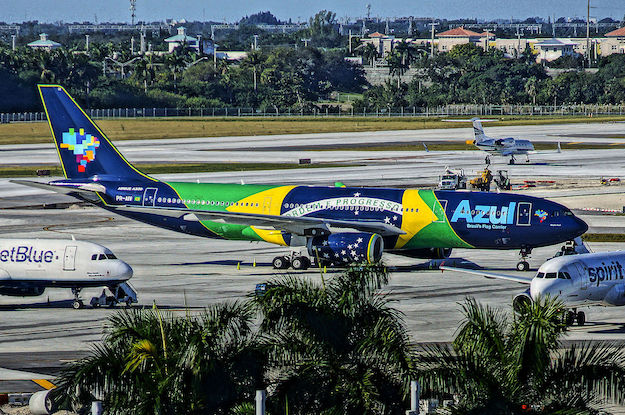After weathering the worst recession of a century, Brazil’s economy is showing signs of life. Unemployment is down, GDP is up, and an important sector is enjoying a sustained comeback: The capital markets for initial public offerings, or IPOs, for Brazil-based companies are the most active they have been in at least six years.
The first three quarters of the year were strong, with IPOs from eight Brazil-based companies – the most since the same period in 2011, according to Dealogic. These include airline Azul and the Brazilian subsidiary of French retailer Carrefour.
The current quarter looks even more promising, with IPOs expected from Burger King Brasil and Petrobras subsidiary BR Distribuidora, according to submissions this month with the CVM, Brazil’s securities regulator. Votorantim Metais Holding, the metals business controlled by the Votorantim Group, also plans to sell 31 million common shares on the NYSE and the Toronto Stock Exchange (TSX), according to a regulatory filing with the Securities and Exchange Commission.
Hans Lin, Bank of America Merrill Lynch’s head of investment banking in Brazil, expects a total of five or six IPOs in the current quarter; Roderick Greenlees, global head of investment banking at Itaú BBA, predicts three to five before year’s end.
Under Greenlees’s more conservative estimate, 2017 will have the highest number of IPOs since 2011. If Lin’s slightly higher estimate proves accurate, this year will beat any for IPOs since 2007.
Either way, this year marks a notable resurgence, ending a three-year dry spell, injecting needed optimism into the country and reflecting more investor confidence. This is significant to Brazilians, to cash-strapped businesses in the country, but also to the pension funds from California to Florida that often invest in such deals.
It also means that while political risk remains a factor – President Michel Temer is facing numerous corruption charges, and the 2018 president election is a wildcard – investors are betting the worst days are over. Economic and fiscal reforms have not come as fast as hoped, but they have encouraged investors to put money into public equity offerings. Not even Temer’s ouster would disrupt this trend, as long as his economic team’s guidance prevailed, experts said.
“People (i.e. investors) are more comfortable with the direction of the economy in Brazil and so are more comfortable in adding risk,” Lin of Bank of America Merrill Lynch told AQ. “Investors wish the reforms could be done faster but the good thing is that they are happening.”
Among the factors feeding the current enthusiasm is that investors have found several Brazilian companies that have remained attractive, thriving even in hard times. This is reassuring, given memories of Brazil’s recent boom-and-bust, when several among them were ensnared by the hype, and paid for it. In 2007, for example, 66 Brazil-based companies had IPOs. Several of them are no longer publicly traded.
“Today I see investors being a lot more diligent and selective,” said Lin. “This wave of new companies, they are more prepared on average than the ones in 2007 were.”
Global factors have also been pivotal. The global economy has improved and the global IPO market has picked up significantly, benefiting Brazil, says Kathleen Smith, Principal at Renaissance Capital, a manager of IPO-focused Exchange Traded Funds.
“There is a lot of quantitative easing, and so the global markets have performed well,” Smith said. “When global markets perform well, IPO activity can pick up.”
Indeed, companies based elsewhere in Latin America but dependent on Brazil’s market for their bottom lines are also benefiting. The long-awaited IPO of Argentina-based online travel company Despegar, backed by Tiger Global Management and Expedia, and which goes by Decolar in Brazil, finally took place in September on the New York Stock Exchange.
It was the first IPO of the year for an Argentina-based company, and it fared well. On October 25, Despegar shares closed at $30, up 15 percent from the $26 per share the company priced its IPO before it started trading.
It’s not alone. Latin America-based companies have issued 17 IPOs in the first three quarters of this year, the most since 2011 over the same period. The $7.3 billion volume raised is the second largest year-to-date since 2012, according to Dealogic.
To be sure, this opening of the capital markets for Brazilian companies has not been frictionless. Several companies, such as car rental provider Unidas, backed by Enterprise, had to cancel IPO plans this year. Others, such as Camil, have had to lower their initial offering prices.
The political uncertainty remains a hurdle as well. Some companies may be going public now to avoid the 2018 presidential campaign season, and the increase in volatility that may bring.
Still, investors expect the IPO activity to continue. Brazil has seen some structural changes that are unlikely to be reversed, such as the fall of interest rates. The Selic benchmark interest rate is at 7.5 percent, significantly down from 14.25 percent just over a year ago. Goldman Sachs’ Alberto Ramos predicts it will drop to 7.0 percent by the end of this year.
That means investors in Brazil will increasingly shift from fixed income to equities, and take on greater risks. It will also motivate companies to make capital investments.
Investors’ more selective criteria for companies should also serve as a buffer against sudden reversals, Lin said.
“The investment community raised the bar for companies,” he said. “You see a better quality this time around.”
—
Sreeharsha is a journalist based in Rio de Janeiro.







